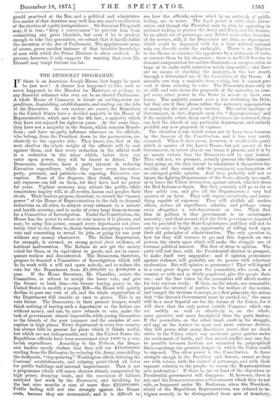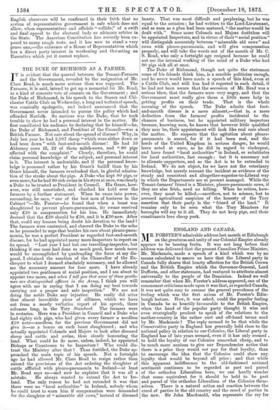THE DEMOCRAT PROGRAMME.
IF there is an American Joseph Hume, how happy he must be just now ! A chance has happened to him such as never happened to the Member for Montrose, or perhaps to any financial reformer who ever sat in an elected Parliament. A whole House of Commons is intent on cutting-down ex- penditure, diminishing establishments, and rooting out the jobs of the Executive. As our readers are aware, the Democrats in the United States have a decided majority in the House of Representatives, which met on the 4th inst., a majority which they have not enjoyed for eighteen years. At the same time, they have not a majority in the Senate, which remains Repub- lican ; and have no party influence whatever on the officials, who belong, from the President down to the postmasters, ex- clusively to the opposite side. They know, too, that at the next election the whole weight of the officials will be cast against them, and that every reduction in the official staff is a reduction in the army which, before they can enter upon power, they will be forced to defeat. The Democrats, therefore, have a party interest' in reducing Executive expenditure, while they have every interest— party, personal, and patriotic—in exposing Executive cor- ruption. None of the disgrace, they think, arising from any exposure can fall on them, for they have had no power for years. Vigilant economy may attract the public, while remorseless inquiry will, at all events, harass and perplex their rivals. Their leaders propose, therefore, to stretch the "money power " of the House of Representatives to the full, to demand reductions on all sides, to subject every estimate to a minute and hostile scrutiny, and to make of every large item an excuse for a Committee of Investigation. Under the Constitution, the House has the power to refuse to vote money if it pleases, and may, by using this power, compel every department not abso- lutely vital to the State to choose between accepting a reduced vote and consenting to reveal its jobs, or going for one year without any money whatsoever. The Indian Department, for example, is accused, on strong prima facie evidence, of habitual malversation. The Indians do not get the money voted for them, or its equivalent in goods, and are in conse- quence restless and discontented. The Democrats, therefore, propose to demand a Committee of Investigation which will do its work with a will and spare nobody, and to reduce the vote for the Department from £1,400,000 to £800,000 a year. If the Home Secretary, Mr. Chandler, resists the Committee, or refuses to accept the lower vote, and gets the Senate to back him—the Senate having power in the United States to modify a money Bill—the House will quietly decline to pass any vote at all, and the whole organisation of the Department will tumble at once to pieces. This is no vain threat. The Democrats, in their present temper, would think nothing of leaving such a department as the Indian one without money, and can, by mere refusals to vote, make the task of government almost impossible, while posing themselves as the friends of the poor taxpayer and the enemies of cor- ruption in high places. Every department in every free country has always bills to present for plans which it thinks useful, but which are not indispensable, and in the United States the Republican officials have been accustomed since 1860 to a very lavish expenditure. According to the Tribune, the Demo- crat leaders openly declare that they will cut £10,000,000 sterling from the Estimates, by reducing the Army, remodelling the dockyards, " depopulating " Washington offices, thinning the Customs' establishments, and refusing point-blank all votes for public buildings and internal improvement. That is not
a programme which will annoy electors already exasperated by high prices, decaying trade, and the succession of failures
analysed last week by the Economist, and involving for the last nine months a sum of more than £24,000,000. Public feeling will not rise strongly against the Demo- crats, because they are economical; and it is difficult to see how the officials, unless aided by an outbreak of public feeling, are to resist. The legal power is with their adver- saries, and though the President may be able, by appealing to national feeling, to protect the Army and Navy, and the Senate, by an adroit use of patronage, may defend some other branches of the service, still, if the Democrats are firm, no department which could be dispensed with for a time without national ruin can directly resist the onslaught. There is no Minister in the House to convince his opponents by a statement of facts, or convert them by his eloquence ; there is no Civil Service to demand compensation for sudden dismissal,—a compensation so large as to make swift reduction nearly impossible; and there are no means of checking the majority, in the last resort, through a determined use of the formalities of the House. A minority can stop a majority from voting, but it cannot pre- vent it from refusing to vote. The Democrats have only to sit still, and vote down the proposals of the minority, to com- pel every other power in the State to accede to their own terms. The majority cannot pass a law abolishing the Debt, but they can if they please refuse the necessary appropriation of money for the next year's interest. The entire machine of Government, in fact, depends upon the "Appropriations," and if the majority refuse them until grievances are redressed, they can lock the wheels of any particular department, and entirely prohibit any new proposals of expense.
The situation is one which seems not to have been foreseen by the framers of the Constitution, and it has very rarely occurred. When it does occur, however, it enables the party which is master of the Lower House, but not master of the Government, to extort almost any terms it pleases, and it is by no means certain that the Democrats will be very lenient. They will not, we presume, actually prevent the Government from going on, for they intend to administer it themselves by- and-by, and they cannot risk the permanent condemnation of an outraged public opinion. And they probably will not so injure the fighting Departments of the State, already too small, as to leave the Union defenceless against attack, whether from the Red Indians or Spain. But they certainly will go as far as they safely can, and give all the Departments a very bad quarter of an hour. They will expose everybody, and every- thing capable of exposure. They will abolish all useless offices, reduce all superfluous salaries, and perhaps sweep I away altogether a sub-department or two. Their .first idea in politics is that government is an unfortunate necessity ; and their second, that the little government required can be provided by the State Legislatures; and they will not be sorry to seize so bright an opportunity of falling back upon their old principles of administration. The only question is, how far they will venture to go, and this depends on two powers, the strain upon which will make the struggle one of extreme political interest. The first of these is opinion. The party will not dare, with the Presidential election in prospect, [ to make itself very unpopular ; and if opinion pronounces against violence, will probably use its powers with reluctant moderation. But will opinion so pronounce ? That will depend in a very great degree upon the journalists, who must, in a country so wide and so thinly populated, give the people their cue ; and the line taken by the journalists will afford matter for very curious study. If they, on the whole, are reasonable, postpone the interest of parties to the welfare of the nation, and compel the factions to accept, as a first principle, the axiom that " the Queen's Government must be carried on," the omen will be a most hopeful one for the future of the Union, for it will show that the only power outside Congress which can act swiftly as well as effectively is, on the whole, more patriotic and more far-sighted than the party leaders. If the journalists, on the other hand, exult in the struggle, and egg on the leaders to more and more extreme devices, they will prove, what many Americans assert, that no check exists in the Union which can moderate great parties under the excitement of battle, and that armed conflict may one day be possible between factions not separated by geographical lines,—perhaps the greatest danger to which the. Union could be exposed. The other power is the Constitution. Is there strength enough in the President and Senate, armed as they are with vetoes, with the control of patronage, and with their separate relation to the people, to coerce the Representatives into moderation ? If there is, one at least of the objections to Presidential government will disappear. If, however, there is not, and the Democrats master a Government which they do not rule, as happened under Mr. Buchanan, when'-the President, afraid of the Republican Representatives, was reduced to in- trigues scarcely to be distinguished from acts oL treachery,
English observers will be confirmed in their faith that no system of representative government is safe which does not allow, when representatives and officials " collide," of a swift and final appeal to the electoral body as ultimate arbiter in the State. The American Constitution has recently been ex- posed to many rough tests, and it has now to stand a very grave one,—the existence of a House of Representatives which has a direct party interest in weakening and thwarting an Executive which yet it cannot replace.







































 Previous page
Previous page